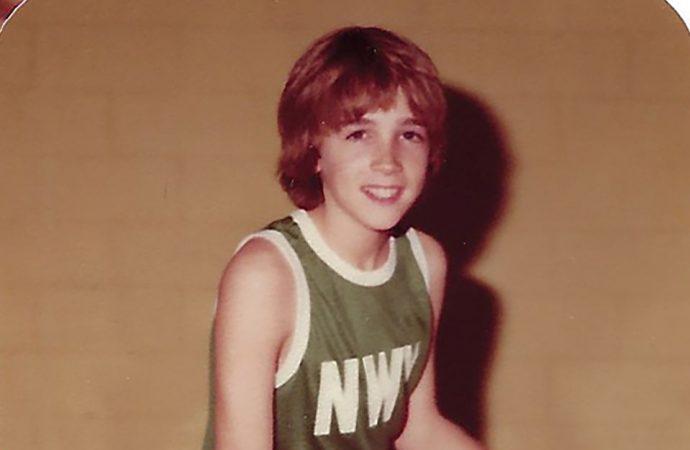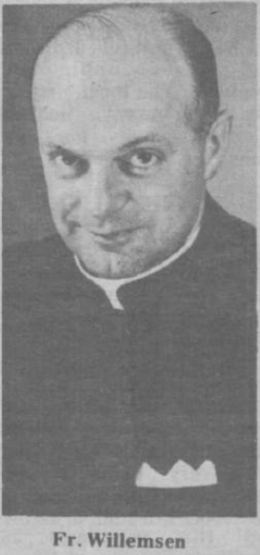|
Texas abuse survivor says publishing names helps ‘reclaim his childhood’
By Charles Collins
Allen Hebert was 12-years-old in 1981, when he met Father Adrianus Johannes Willemsen - “Father Andy” - a Dutch priest serving in the Diocese of Austin. The priest became friends with Hebert’s family, and his parents had no suspicions about the close friendship the cleric was forming with their son. Soon, the priest began manipulating the adolescent, and told him that he was helping him explore his sexuality as he molested him. “I never felt intimidated or threatened, rather I was gently led into a very abusive relationship. The relationship continued even after I stopped the physical aspects of it. It was only much later in my life that I recognized my relationship with Father Andy as abusive,” Hebert relates on his website. Willemsen was one of 22 priests named by the Diocese of Austin on Jan. 31 as having a credible accusation made against him. In all, over 300 clerics and religious have been named by the 15 dioceses in Texas as having been credibly accused of abuse - 14 dioceses released their lists with 286 names on it on Jan. 31; the Diocese of Fort Worth began publishing credibly accused clergy and religious on its website in 2007, and its list currently has 17 names. Hebert told Crux that he is happy that the list was published, but finds the information on the Austin and Galveston-Houston websites - the two Texas dioceses in which Willemsen served - to be “clinical, hard, [and] cold” due to a lack of details about the assignments of the alleged abusers. He compliments the Archdiocese of San Antonio for being “much more comprehensive,” adding their website “reads like you are speaking with someone who cares and knows that a victim wants to know about their abuser and put their lives back together after having gained some closure to that chapter.” “As a survivor, I have a desire to reclaim my childhood and this abusive relationship is one that is somewhat a mystery to me. As I have come to terms with what happened to me, I desire to understand it as an adult. I want to know the man who abused me, when was he ordained, where did he serve, how many others reported abuse, was he laicized? How was he punished? The more details the easier it is for me to fully understand that abusive relationship and how it shaped me,” he said. Willemsen, was ordained in 1954 for the Congregation of the Mission, commonly known as the Vincentians, and later served for one year as a teacher at St. John’s Seminary in Camarillo, California. It was another teaching position which brought him to Texas, where he taught at St. Mary’s Seminary in Houston from 1964 until 1981, the year he met the Hebert family. (These details of Willemsen’s past greatly concerned Hebert when he realized he had been abused: “I immediately thought of how many future priests he had access to and how he probably taught them sexual immorality that he inflicted on me. His influence on the Church was so much greater than a typical parish priest.”) In 1982, Willemsen became a priest of the Diocese of Austin, and took up a pastoral assignment in the town of Bremond, where he served for seven years. It was during this time the abuse of Hebert began. “The abusive relationship caused me to cheapen my own dignity as a person and that affected many aspects of my life without me knowing it,” Hebert said, adding that Willemsen had many other victims, “he told me about them.” Hebert first approached the Diocese of Austin about Willemsen in the late 1990s, when he asked to speak with then-Bishop John McCarthy, who died last year. “When I arrived at his office, he was pale white, and he didn’t wait for me to start the conversation. He told me that when he read my message and saw that name that he got chills,” Hebert told Crux. “I asked if he remembered Father Andy and I told him that he sexually abused me as a child. He acknowledged that he knew him and that he never liked him and that in 1988 someone had made a report about him in the Archdiocese of Galveston-Houston [where McCarthy served as an auxiliary bishop from 1979-1985], but didn’t leave his name. He asked if I was that young man. Unfortunately I had to tell him I was not, there was another victim,” he continued. “Bishop McCarthy told me that he was so very sorry for what happened to me. He also told me that back in 1988 when he received the allegation from the Archdiocese of Galveston-Houston, that he immediately told Andy to pack his bags and get out of his diocese and go back to the Netherlands. At that point in my healing process I just wanted to know that someone else knew what had happened. I don’t even know that I wanted an apology, just knowing that someone knew what he did was enough,” Hebert said. At the time, Willemsen continued to be incardinated in the Diocese of Austin and was serving as a priest in the Diocese of ‘s-Hertogenbosch in the Netherlands, where he arrived in 1989, serving as pastor in parishes in the villages of Steensel and Duizel. After the Boston Globe exposed the years of abuse cover-up in the Archdiocese of Boston in 2002, Hebert discovered Willemsen was still in ministry in the Netherlands, and went to then-Bishop of Austin Gregory Aymond, who is now Archbishop of New Orleans. “This time I was seeking justice,” Hebert told Crux. “I asked [Aymond] about what happened to Father Andy Willemsen and after some research I was informed that he was still in active ministry. He assured me that he would be contacting Father Andy’s superiors and ensuring that he would be removed from active ministry,” he continued. The Diocese of ‘s-Hertogenbosch records show Willemsen was removed from ministry in 2004 - he died in 2012. Hebert told Crux that Aymond also offered his sincere apologies on behalf of the Church and encouraged him to go to counseling, which was paid for by the diocese. “I attended a number of counseling sessions and they were immensely valuable to me and helped me to deal with the guilt I had been carrying around for so many years. I blamed myself for the abuse, I was ashamed of what I had done and had profound fear that someone would find out my secret,” he said. “The breakthrough came when the counselor asked me if I had told my parents. I had not. She asked how they would feel if they knew. I said they would be mad. She asked who I thought they would be mad at, and without any hesitation, I told her, ‘they would be mad at me.’ As soon as I spoke those words, the chains began to fall off my wrists and I forgave myself and realized, no, I felt for perhaps the first time that I was a victim,” said Hebert. In 2018, the case of ex-Cardinal Theodore McCarrick - who has been accused of abusing minors, as well as sexual misconduct with seminarians - made Hebert decide to go public with what happened to him. In the summer, he will be publishing Abuse of Trust, a book chronicling the lives of several victims of clerical sexual abuse. Hebert said the book will seek to provide healing for the victims, the family and the Church. Hebert said the book tells the stories of survivors who still love the Church, and it will try to offer practical advice on how to combat abuse. He made an appointment last year to see Bishop Joe Vásquez, who succeeded Aymond in 2010. “This time I came offering to help the Church I love. I shared with them my story, what victims want and need to hear from the leaders of the Church and offered to help in any way I could to equip him and the priests of our diocese to seek out other victims and show them empathy and do what I could to minister directly to other victims. Bishop Joe has offered counseling for my wife and I and is very responsive to my inquiries and is being very pastoral,” Hebert said. Hebert told Crux he wants to see the burden be lifted from the laity in the fight against sex abuse. “Currently safe environment programs teach the attendee what grooming looks like, how pervasive the problem is and how to report it to the authorities and the Church. It doesn’t really enable Joe Catholic to identify and question a typical abusive priest,” he said. “Most abusers have narcissistic qualities in that they work very hard to make everyone believe they can do no wrong and when criticized, they attack back with zeal. Most people would never question a good abuser, because they are good at what they do, they use not only their access, but their power to abuse.” Hebert would like to see the Church return to a model of parents being the primary educators of their children when it comes to religion. “The hierarchy through their rules and attitudes towards the laity have convinced parents that they need to turn over their children to the Church to learn the faith,” he explained. “Overnight retreats away from their families, drop off religious education requirements to receive the sacraments all reinforce that the home is not where the faith is passed on and the parents are not the most important person to teach them. If the parents are not equipped to pass on the faith, then we should fix that problem, not bypass the parents and teach the kids from a warm body and a book,” he said. “My parents thought there was nothing better for me in my faith life than to spend a lot of time with a priest, because priests are holy and they can surely teach me the faith better than they could ever hope to. This attitude still exists today,” said Hebert.
|
.
Any original material on these pages is copyright © BishopAccountability.org 2004. Reproduce freely with attribution.

